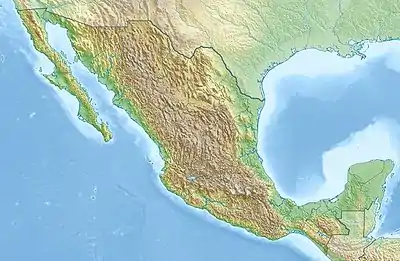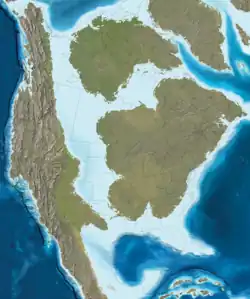| El Gallo Formation | |
|---|---|
| Stratigraphic range: Campanian | |
| Type | Geological formation |
| Sub-units | El Disecado Member |
| Thickness | up to ca. 1,150 m (3,770 ft) (El Disecado Member) |
| Lithology | |
| Primary | Mudstone, sandstone |
| Other | Siltstone |
| Location | |
| Coordinates | 30°06′N 115°48′W / 30.1°N 115.8°W |
| Approximate paleocoordinates | 35°30′N 85°48′W / 35.5°N 85.8°W |
| Region | |
| Country | |
 El Gallo Formation (Mexico) | |

Paleogeography of the Campanian
The El Gallo Formation is a geological formation in Mexico whose strata date back to the Late Cretaceous, Campanian epoch, specifically dated to 75.21 ± 0.07 Ma and 74.55 ± 0.09 Ma.[1] Dinosaur remains are among the fossils that have been recovered from the formation.[2]
Vertebrate paleofauna
Crurotarsans
| Crurotarsans of the El Gallo Formation | ||||||
|---|---|---|---|---|---|---|
| Genus | Species | Location | Member | Abundance | Notes | Images |
| Brachychampsa | [3] | |||||
| Leidyosuchus | ||||||
Dinosaurs
Indeterminate theropod, coelurosaur, dromaeosaurid, tyrannosaurid, hadrosaurid, and ankylosaurid remains are known from the formation.[4] Dinosaur eggs are known from the formation.[5] Alexornis antecedens actually comes from the La Bocana Roja Formation. An indeterminate hadrosaurine is known from the formation.[6]
| Dinosaurs of the El Gallo Formation | ||||||
|---|---|---|---|---|---|---|
| Genus | Species | Location | Member | Abundance | Notes | Images |
| cf. Chirostenotes[4] | C. sp. | |||||
| Gryposaurus[6] | Indeterminate | |||||
| Lambeosaurus[7] | L. laticaudus[7] | |||||
| Magnapaulia | M. laticaudus | |||||
| Saurornitholestinae[4] | Indeterminate | |||||
| cf. Troodon[8] | T. formosus[8] | |||||
| Tyrannosauridae[4] | Indeterminate | Possibly represents a new taxon.[4] | ||||
Lepidosaurs
| Lepidosaurs of the El Gallo Formation | ||||||
|---|---|---|---|---|---|---|
| Genus | Species | Location | Member | Abundance | Notes | Images |
| Paraglyphanodon[9] | Indeterminate[9] | Probably a juvenile Polyglyphanodon.[5] | ||||
| Polyglyphanodon[5] | P. bajaensis[5] | |||||
Mammals
| Mammals of the El Gallo Formation | ||||||
|---|---|---|---|---|---|---|
| Genus | Species | Location | Stratigraphic position | Abundance | Notes | Images |
| Mesodma[10] | M. formosa[10] | |||||
| Pediomys[5] | Indeterminate[5] | |||||
| Stygimys[9] | Indeterminate[9] | |||||
Amphibians
An indeterminate albanerpetontid is known from the formation.[11]
See also
References
- ↑ El Gallo Formation at Fossilworks.org
- ↑ "El Gallo Formation." Weishampel et al., 2004, pp.587-588
- ↑ "Appendix: Summary of the Mesozoic Reptilian Fossils of California," in Hilton (2003) p. 277
- 1 2 3 4 5 Ramírez-Velasco, A. A.; Hernández-Rivera, R. (2015). "Diversity of late cretaceous dinosaurs from Mexico" (PDF). Boletín Geológico y Minero. 126 (1): 63–108.
- 1 2 3 4 5 6 "El Gallo Formation, Baja California Del Norte, Mexico," in Sullivan and Lucas (2006). Page 16.
- 1 2 Cabrera Hernandez, Jonathan S.; Hernandez Rivera, René; Montellano, Marisol (2018). "FOSSIL EGGSHELLS AND TWO PERINATAL DINOSAURS FROM THE EL GALLO FORMATION (LATE CRETACEOUS), EL ROSARIO, BAJA CALIFORNIA, MEXICO". Journal of Vertebrate Paleontology, Program and Abstracts. 38.
- 1 2 "Appendix: Summary of the Mesozoic Reptilian Fossils of California," in Hilton (2003) p. 260
- 1 2 "4.5 Estado de Baja California Norte, Mexico; 1. El Gallo Formation," in Weishampel, et al. (2004). Pages 587-588.
- 1 2 3 4 Listed as "cf. Paraglyphanodon" in "El Gallo Formation, Baja California Del Norte, Mexico," in Sullivan and Lucas (2006). Page 16.
- 1 2 Listed as "Mesodma cf. M. formosa" in "El Gallo Formation, Baja California Del Norte, Mexico," in Sullivan and Lucas (2006). Page 16.
- ↑ Romo de Vivar Martínez, Paulo R.; Montellano Ballesteros, Marisol; García Alcántara, Dalia; Romo de Vivar Martínez, Paulo R.; Montellano Ballesteros, Marisol; García Alcántara, Dalia (December 2016). "Primer registro de la Familia Albanerpetontidae (Lissamphibia) en la formación El Gallo (Campaniano, Cretácico Superior), Baja California, México". Boletín de la Sociedad Geológica Mexicana (in Spanish). 68 (3): 571–580. ISSN 1405-3322.
Bibliography
- Sullivan, R.M., and Lucas, S.G. 2006. "The Kirtlandian land-vertebrate "age" – faunal composition, temporal position and biostratigraphic correlation in the nonmarine Upper Cretaceous of western North America." New Mexico Museum of Natural History and Science, Bulletin 35:7-29
- Weishampel, David B.; Peter Dodson, and Halszka Osmólska (eds.). 2004. The Dinosauria, 2nd edition, 1–880. Berkeley: University of California Press. Accessed 2019-02-21. ISBN 0-520-24209-2
- Hilton, Richard P. 2003. Dinosaurs and Other Mesozoic Reptiles of California. Berkeley: University of California Press. 318 pp.
Further reading
- M. L. Chavarria-Arellano, T. R. Simões, and M. Montellano-Ballesteros. 2018. New data on the Late Cretaceous lizard Dicothodon bajaensis (Squamata, Borioteiioidea) from Baja California, Mexico reveals an unusual tooth replacement pattern in squamates. Anais da Academia Brasileira de Ciências
- O. A. López Conde, J. Sterli, M. L. Chavarría Arellano, D. B. Brinkman, and M. Montellano Ballesteros. 2018. Turtles from the Late Cretaceous (Campanian) of El Gallo Formation, Baja California, Mexico. South American Journal of Earth Sciences 88:693-699
- B. R. Peecook, J. A. Wilson, R. Hernandez-Rivera, M. Montellano-Ballesteros, and G. P. Wilson. 2014. First tyrannosaurid remains from the Upper Cretaceous "El Gallo" Formation of Baja California, Mexico. Acta Palaeontologica Polonica 59(1):71-80
- A. A. Ramírez Velasco, R. Hernández Rivera, and R. Servin Pichardo. 2014. The hadrosaurian record from Mexico. In D. A. Eberth & D. C. Evans (ed.), Hadrosaurs 340-360
- H. E. Rivera Sylva, K. Carpenter, and F. J. Aranda Manteca. 2011. Late Cretaceous nodosaurids (Ankylosauria: Ornithischia) from Mexico. Revista Mexicana de Ciencias Geológicas 28(3):371-378
- W. J. Morris. 1973. Mesozoic and Tertiary vertebrates in Baja California. National Geographic Society Research Reports (1966) 7:197-209
- A. Silva Bárcenas. 1969. Localidades de vertebrados fósiles en la Republica Méxicana [Vertebrate fossil localities in the Mexican Republic]. Universidad Nacional Autónoma de México, Instituto de Geología, Paleontología Mexicana 28:1-34
- W. Langston and M. H. Oakes. 1954. Hadrosaurs in Baja California. Bulletin of the Geological Society of America 65(12):1344
This article is issued from Wikipedia. The text is licensed under Creative Commons - Attribution - Sharealike. Additional terms may apply for the media files.